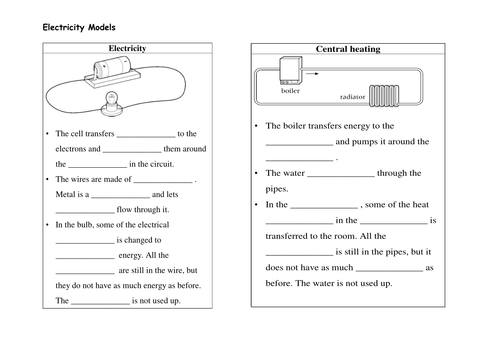



KS3 - Circuits 2
Has basic animated slides with examples of electron movement and principles of carrying charge.
Follows from KS3 - Circuits 1 and leads on to concept of resistance.
Ends with question about lightning (air has a high resistance, how does lightning 'flow'?)
Infomation:
Links to prior topics :
Basic physics, Circuits 1
Skills Developed:
Diagrams/graphical work, physical to abstract, logic
Learning Objectives :
Revise PD, electrons and charge
To identify new circuit components and understand conductors
To explain what is happening in a circuit, using different models
To infer a relationship between voltage current and resistance
Assessment Criteria for Objectives:
Comparison of models
Understanding of relationships between VIR
Teaching & Learning Strategies :
Visual and tactile,
labelling,
abstraction,
comparison modelling,
modelling with rope as circuit
Resources / Materials Required
School circuit kit (cells, cables, switches, bulbs)
Ammeters
Optional Rope Model
Lab Safety Considerations [CLEAPSS / Hazcards / COSHH]
Electrical safety (1.5-3v, IE negligible, but good time to start on electrical safety)
Practical Work/Demonstration
Circuit creation – Battery + bulb + ammeter to measure,
Optional rope model of a circuit
Literacy /Numeracy/ICT incl. School-wide objectives
Numeracy links with voltage calculations ,
literacy with the labels.
Other Broader/Cross-curricular links -
Household / hobby electronics,
DT links,
Scientific inquiry
Has basic animated slides with examples of electron movement and principles of carrying charge.
Follows from KS3 - Circuits 1 and leads on to concept of resistance.
Ends with question about lightning (air has a high resistance, how does lightning 'flow'?)
Infomation:
Links to prior topics :
Basic physics, Circuits 1
Skills Developed:
Diagrams/graphical work, physical to abstract, logic
Learning Objectives :
Revise PD, electrons and charge
To identify new circuit components and understand conductors
To explain what is happening in a circuit, using different models
To infer a relationship between voltage current and resistance
Assessment Criteria for Objectives:
Comparison of models
Understanding of relationships between VIR
Teaching & Learning Strategies :
Visual and tactile,
labelling,
abstraction,
comparison modelling,
modelling with rope as circuit
Resources / Materials Required
School circuit kit (cells, cables, switches, bulbs)
Ammeters
Optional Rope Model
Lab Safety Considerations [CLEAPSS / Hazcards / COSHH]
Electrical safety (1.5-3v, IE negligible, but good time to start on electrical safety)
Practical Work/Demonstration
Circuit creation – Battery + bulb + ammeter to measure,
Optional rope model of a circuit
Literacy /Numeracy/ICT incl. School-wide objectives
Numeracy links with voltage calculations ,
literacy with the labels.
Other Broader/Cross-curricular links -
Household / hobby electronics,
DT links,
Scientific inquiry
Something went wrong, please try again later.
This resource hasn't been reviewed yet
To ensure quality for our reviews, only customers who have purchased this resource can review it
Report this resourceto let us know if it violates our terms and conditions.
Our customer service team will review your report and will be in touch.
£2.50